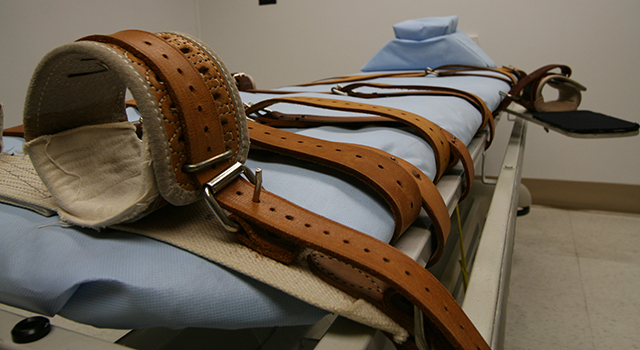By Jean Gonzalez - Florida Catholic - Orlando
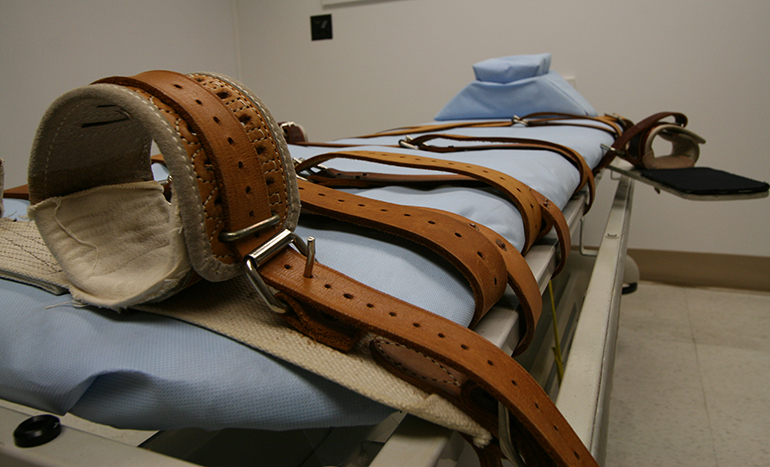
Photographer: Florida Dept. of Corrections
View of the gurney in which Florida's death row inmates are executed.
ORLANDO | The drive to Starke in north Florida is indeed stark.
Joe Koechler knows that drive all too well, and remembers the first time he sat in a bus traveling down a long, sparse stretch of road toward Florida State Prison.
“You say, ‘Oh my God, we’re in the middle of nowhere.’ But that’s why they would put the prison here,” said the retiree and parishioner of Our Lady of Lourdes in Daytona Beach. “You meet wonderful people up there at the vigils. For us, we are being a voice on this life issue.”
Koechler has attended the prayer vigils held yards in front of the death house before executions since 2009. Of those 28 executions (three under Gov. Charlie Crist and the rest under Gov. Rick Scott), he only missed one because of an emergency appendectomy. After eight years, Koechler recognizes the familiar faces gathered for prayer, such as the 80-something woman dedicated to the cause and the same few reporters and cameramen who occasionally cover a vigil.
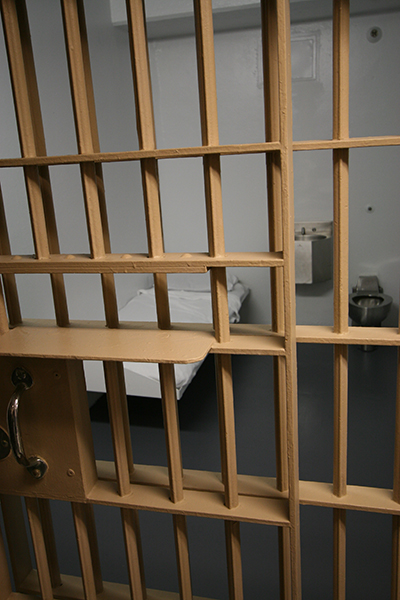
Photographer: Florida Dept. of Corrections
View of a cell in Florida's death row.
The trip is long and isn’t cheap, but Koechler said it is worthwhile because it creates awareness of the realities of the death penalty. He attends the vigils to pray for the victims of crimes, their families left behind, the officials who pursue the death penalty, the convicted on death row and their families as well. He also goes to remind others that state-sanctioned murder, regardless if it is of a convicted murderer, is wrong.
“You stand, sometimes in the heat and sometimes in a lightning storm, and you wait to hear that the execution has happened,” Koechler said. “You know where it is going to happen. There is this huge bell (part of the vigil) near where we stand. We stand in silence but we know when the execution happened because the bell is rung. We’re told that the prisoners are able to hear that bell rung as well.”
Spiritual responsibility
While Koechler stands in vigil in front of Florida State Prison, other Catholics across Florida hold vigils at the same time in their own parishes. Koechler is grateful his pastor, Father Phil Egitto, supports the effort and attends the vigil himself. The priest said it is imperative society and the media realize people care about abolishing the death penalty.
“I go because people are executed in our name as a citizen of the state of Florida,” Father Egitto said. “If no one were there, it would seem no one cared and the state could just get away with it, while people are just watching “Jeopardy” at home. … I stand there because of my faith and in response to Christ’s command to bear the fruit of justice. … Capital punishment is not peace and it certainly is not just.”
Father Egitto added that as a leader in his community, he feels he has a responsibility to offer his parishioners “the opportunity to live their faith.” It is a belief also shared by Pope Francis, who recently spoke about capital punishment. He couldn’t have made himself more clear: The death penalty is “contrary to the Gospel.”
“It is, in itself, contrary to the Gospel, because a decision is voluntarily made to suppress a human life, which is always sacred in the eyes of the Creator and of whom, in the last analysis, only God can be the true judge and guarantor,” the pope said as he marked the 25th anniversary of the Catechism of the Catholic Church at the Vatican Oct. 11.
The Christian faith, he said, always has insisted on the dignity of human life from the moment of conception to natural death. So the Church has a continuing obligation to speak out when it realizes something that was accepted in the past actually contradicts Church teaching.
“Therefore, it is necessary to reiterate that, no matter how serious the crime committed, the death penalty is inadmissible, because it attacks the inviolability and dignity of the person,” Pope Francis said.
Is enough being done?
There are many opponents of the death penalty who agree wholeheartedly with the pope and see his public declaration as a much-needed shot in the arm for the abolitionist movement.
According to the Catholic Mobilizing Network, a national organization working in close collaboration with the U.S. Conference of Catholic Bishops to end the death penalty and promote restorative justice, 2016 ended with the fewest number of executions in a quarter-century, and with the lowest number of people sentenced to death since 1976, when capital punishment was reinstated in the United States. The organization boosts a 2016 Pew Report that showed opposition to the death penalty to be the highest it has been since 1976, and showed support for the death penalty at under 50 percent, its lowest in more than decades.
“Despite ever-growing public opposition to the death penalty, a dangerous undercurrent has been developing in this country where politicians are once again using the death penalty to incite fear for political gain,” said Karen Clifton, executive director of the Catholic Mobilizing Network. “As Catholics, we are called to seek responses to harm that are not only retributive, but also restorative. The death penalty favors vengeance over reconciliation and transformation. It is not restorative. Continuing to choose death over life not only denies the Gospel, but falls all too closely to the temptations of our society.”
Sobering facts
Florida is one of those states where the undercurrent is fierce, and it comes as no surprise to Mark Elliott, executive director of Floridians for Alternatives to the Death Penalty, who said, “Florida has relied heavily on executions for almost 200 years.”
“After the Civil War up until 1950, Florida had the highest per-capita rate of lynchings in the U.S.,” Elliott said. “Hard-fought progress for human rights, civil rights and criminal justice reform comes very slowly in the Deep South. The death penalty is mired in misinformation and misperceptions that perpetuate support for death.”
Florida was one of only five states that imposed more than one death sentence in 2016, and it was one of six states that carried out executions last year. That latter trend continues. After a 19-month hiatus that spanned from January 2016 to August 2017, the Sunshine State, under the direction of Gov. Scott, has resumed executing death row inmates. Two men have been killed within six weeks of each other, and the execution of Patrick Hannon is scheduled for Nov. 8.
Elliott added the challenge for death penalty abolitionists and criminal justice reform advocates is to “effectively convey fact-based information to new and receptive audiences.” That has proven to be difficult, but Elliott said advocates should find hope as facts are on their side:
- With the rulings of Hurst v. Florida and Ring v. Arizona, more than 100 people on Florida’s death row could file motions in the courts disputing their death penalty sentence.
- The death penalty costs taxpayers and the state an average $1 million-$1.5 million per attempt, which means local state attorneys must weigh whether it is even fiscally responsible to pursue the death penalty versus life in prison without the possibility of parole.
- In Florida and in many death penalty states, most of the death sentences are focused in a small number of counties. The 2016 Fair Punishment Project/Harvard Law School report states four of the U.S. counties with “the most extreme and excessive use of death sentencing between 2010-2015” were in Florida — Duval, Hillsborough, Miami-Dade and Pinellas. Additionally, the report noted these “outlier counties” are plagued by “persistent problems of overzealous prosecutors, ineffective defense lawyers and racial bias.”
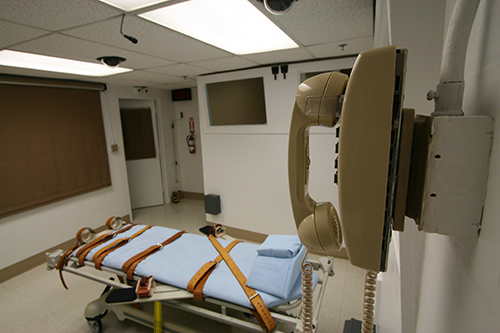
Photographer: Florida Dept. of Corrections
View of the execution chamber in Florida's prison in Starke.
Sharing stories beyond numbers
To teach people about the realities of the death penalty beyond statistics, Elliott’s organization has allied with other advocacy groups for a project in which “experienced storytellers,” who include murdered victims’ family members, exonerees of death row and others, offer first-person accounts of the oppressive and ineffective nature of the death penalty.
For some 40 decades, Marietta Jaeger-Lane has been a devastated family member who speaks to others as she puts a human face on the death penalty. In 1973, during a family camping trip in Montana, her daughter, Susie, the youngest of five, was kidnapped. For long, agonizing months the family did not know if she was dead or alive, until they discovered her horrific fate. Susie had been held captive, raped, strangled and dismembered. She was 7 years old.
Lane spoke to the Florida Catholic while on a speaking tour through Texas, another death penalty-hardened state. Her tour was sponsored by Journey of Hope, an organization she co-founded in the early 1990s that brings together both the families of victims who are murdered and the families of death row inmates, along with exonerees, with the goal of healing through forgiveness.
“Our stories, our voices are very effective because not just statistics and logic and principles, but real-life stories of people with real-life experiences of the death penalty, hopefully, will bring a different perspective beyond that gut-level reaction,” she said. “I can’t tell you how many times I have heard the phrase, ‘If something happened to my child, I would want to kill him.’ Everyone has that response. I had that response. But it cannot stay there.”
A lifelong Catholic, Lane heavily relied on her faith during those months of uncertainty, and more so when the man who kidnapped Susie called Lane exactly one year after he had killed the girl. Lane’s story of grief is common among victims’ families, as they endure the thought of their loved ones’ terrifying last moments. Again, Lane feels fortunate to possess her faith because without it, she could not get past that grief.
“For me, that is one of the precious values of my faith. I know my little girl sits with God. I know she is praying for me,” said Lane, who now lives in Punta Gorda, where she is a member of Sacred Heart Parish. “My story is about my spiritual journey of how God can get you past that grief and anger and vengeance. We become whole and happy when we learn to forgive. Otherwise we are chained to an event of the past, and nothing will change the loss of a loved one.”
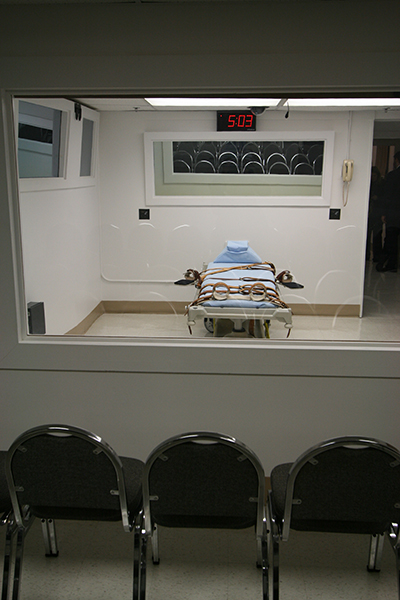
Photographer: Florida Dept. of Corrections
View from the witnesses' side of the execution chamber in Florida's prison in Starke.
Especially not the death penalty, Lane added. It does not offer the closure and healing that prosecutors and government officials tout. Vengeance is a punishment that does not equate justice, Lane said, at least not the restorative justice that is set by the example of God in the story of Cain and Abel. God did not kill Cain as punishment for killing Abel. Instead, God offered banishment and marked Cain to make sure no one would hurt him.
“Our culture was built on the use of violence, and it needs to stop. Every time that the government or a person of authority uses violence to solve a problem, we are communicating that killing people is OK,” Lane said. “Mandatory life in prison is not a piece of cake, and offering that instead of the death penalty does not make an authority less tough on crime.”
She added the money saved by using life without the possibility of parole could be used for something not funded at all — victim ministry.
“Healing takes time and what victims’ families need is to be held, to be loved, to be prayed for and to be listened to without judgment,” Lane said. “It is in the context of a community that values the sacredness of life and the gift of forgiveness that a person can find healing.
“We have to remember, just because something is the law, doesn’t make it moral,” Lane continued. “People of faith should be up front and out loud on this issue.”
Dale Recinella is also someone who shares his personal stories revolving around the death penalty. A lawyer, author of several books on the subject and prison chaplain, his stories reveal intimate portraits of those living in the 6-foot-by 9-foot cells and the families outside the prison walls.
Inmates are offered a spiritual adviser when they are moved to the death house following a death warrant or an execution order. Recinella has served in that role many times, and each experience is tough on the seasoned chaplain. In his books and during countless presentations as an opponent of the death penalty, he has recited every logical reason why the death penalty should be abolished: its economic ramifications; its racist implications; its judicial flaws that lead to improper use by prosecutors and judges; ineffective defense counsel; inability for the incarcerated to offer evidence to clear their names on appeal because of “procedural bar”; and the fact innocent people have died at the hands of the state.
While those facts should sway proponents of the death penalty to “switch sides,” it doesn’t always work, creating a frustrating and figurative brick wall on the issue. Yet, Recinella continues to speak, many times with his wife, Susan, at his side. During an execution, he is with the inmate, and his wife stays offsite with the family of the incarcerated. Over the years, he has learned how facts combined with personal stories can change hearts and minds.
“I’ve shared with people about the Christmas cards and the Valentine’s Day cards and the Father’s Day cards that death row inmates ask for to use and send to the people in their life. We’ve had people come up to us and say, ‘I never thought of these inmates on death row having families. I never thought of them loving them or other people loving them,’” Dale Recinella said. “As soon as we talk about doing human things it pushes against the fallacy that they are not human beings. That is the core issue. That is why Pope John Paul II in ‘Evangelium Vitae’ stressed that no matter what evil a person has done, they do not lose their humanity.”
Enough progress?
Florida’s capital sentencing statute was amended this year to require a unanimous jury recommendation to impose a death sentence. A 2016 amendment to the statute also repealed a provision of Florida’s death-penalty law that had permitted judges to override a jury’s recommendation of a life sentence.
When asked what future steps should be made in the Florida Legislature to move closer to abolishment of the death penalty, Ingrid Delgado, associate for social concerns/respect life for the Florida Conference of Catholic Bishops, said while the unanimous jury legislation is an “incremental improvement,” Florida’s death penalty “remains deeply flawed.”
“Passage of the unanimous jury bill serves as a beginning, and not the end, of this conversation,” she said. “It is imperative that our state leaders conduct a review of Florida’s death penalty that includes investigating why our state has the highest number of exonerees in the nation; why we sentence to death so many people with diminished culpability such as severe mental illness; and how to utilize more wisely the millions of tax dollars that would be saved if the state of Florida no longer carried out executions.”
More could be done, and while the conference does work with legislators, and the bishops of Florida meet annually with the governor to discuss issues of importance to the Church, advocates are still needed from the pews. Forgiveness, prayer, mercy, healing and restorative justice are common themes for those who advocate for abolishment, which they add is truly a pro-life issue.
The question is whether the faithful are ready to pick up the mantle of the cause. And if they do, would it make a difference? All the advocates interviewed for this article agreed it would, including Recinella.
“The fact of the matter is that the support for the death penalty at large, and this includes Florida, has thinned so much that if the pro-lifers came to understand the death penalty is a life issue too, it would tip the balance.”
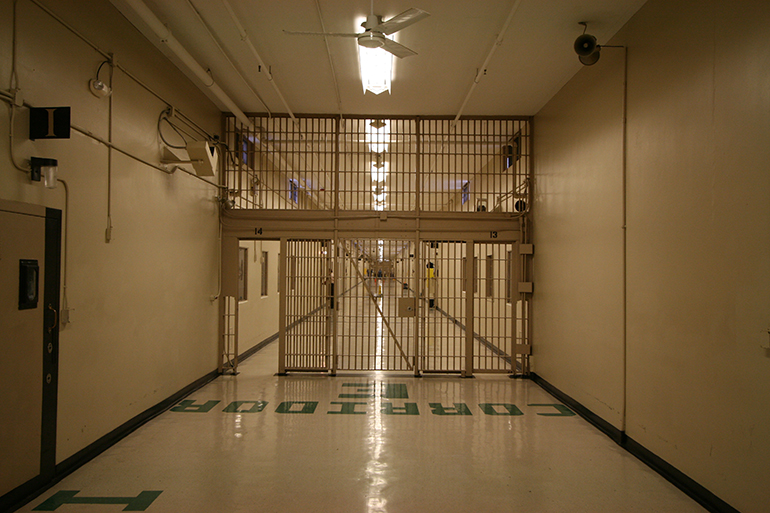
Photographer: Florida Dept. of Corrections
View of the death row corridor at the Florida state prison in Starke.
